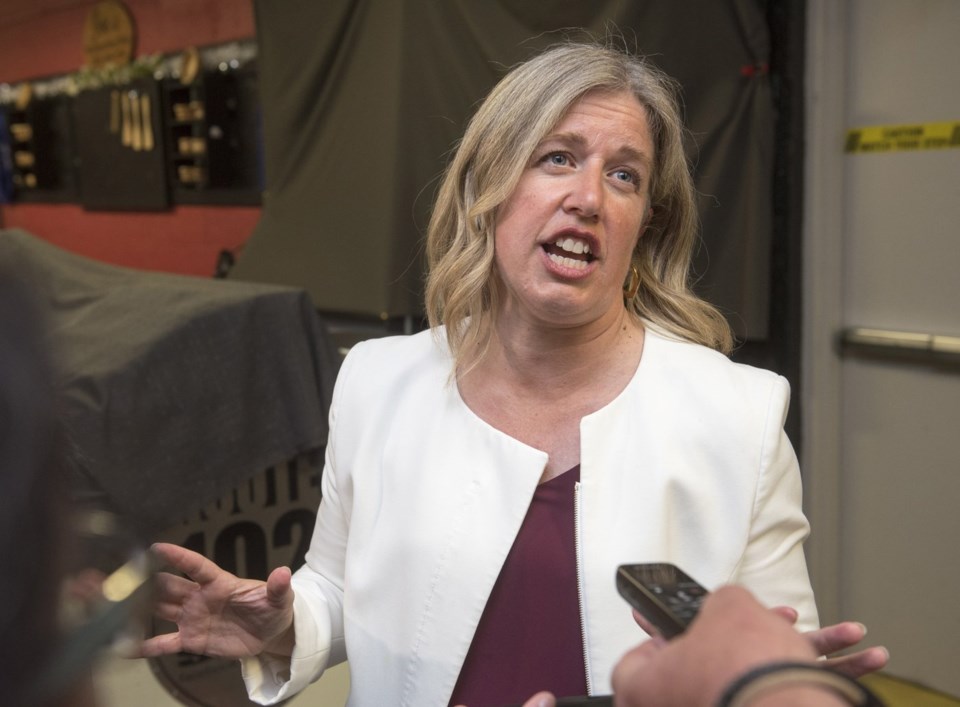FREDERICTON — New Brunswick's Liberals say that if their party is elected, teachers will no longer need parental consent before they can use the preferred first names and pronouns of transgender students under 16.
The Liberal promise is in response to a reform imposed in 2023 by the Progressive Conservative government under Premier Blaine Higgs, who said parents must be informed if their children are questioning their gender identity.
Higgs's changes were criticized across the country, including by Prime Minister Justin Trudeau, but polling suggests the policy is popular in the province.
Liberal Leader Susan Holt made the announcement Thursday in Fredericton as she released her party's platform, which she said would cost about $1.2 billion over four years. Most of the items in the platform have already been announced, including her pledges to open 30 community clinics across the province, cap rent increases at three per cent, and eliminate the provincial sales tax on electricity bills and new multi-unit housing.
However, there is no mention of how her government would handle the federal carbon pricing scheme, a program Higgs has said he would take Ottawa to court over if he is re-elected to a third term.
Holt said the carbon price is a "conversation that we'll need to have with Ottawa." The province, she added, needs a "plan in place that reflects New Brunswick’s reality,” adding that the onus should be on industry to lower emissions.
"What you see in the (platform) is a commitment to making sure that large emitters are paying for their emissions, you see a focus on clean air and clean water … and a goal to get our own grid and production of electricity to 100 per cent non-emitting.”
Higgs promised on Thursday that if re-elected his party would introduce legislation forcing people into drug treatment if authorities deem they "pose a threat to themselves or others."
The $45-million promise includes a new 50-bed rehabilitation facility, the location of which was not announced. Higgs also promised to open a unit offering "treatment-focused programs" at a provincial jail under construction in Minto, N.B., located 45 kilometres northeast of Fredericton.
“A judge may say, ‘We’re going to put you (in jail) for this period of time, but you’ve got to take this program while you’re there,'" Higgs told reporters in Saint John, N.B., about potential future offenders.
"But then the goal is — depending on the length of stay — that’s not the end of it. That’s where you’d have a facility like (the 50-bed centre) or where you have facilities that treat for recovery. The focus is on recovery.”
Reacting to Higgs's announcement, Holt said the Liberals don't support mandatory treatment, adding that the province doesn't have the resources to care for people on wait-lists, let alone people forced into care.
"We don't have the beds or the facilities in place to treat the people who want that treatment today, and so we need to put in place the services for the long list of people who are waiting to get access to that kind of care," she said about drug addiction services.
On Thursday, the Green Party promised to create a "universal school food" program that includes breakfast and lunch.
Funded partly by the federal government, the program would cost about $4 million per year on a per-capita basis for the province, said Green Leader David Coon.
“All too often I have heard stories about teachers who have spent their own money to ensure students in their classes don’t go hungry,” Coon said. “While this is commendable, we need a proper provincewide school breakfast and lunch program in place to ensure that teachers can focus on what they do best — teaching — and students can focus on learning.”
This report by The Canadian Press was first published Oct. 3, 2024.
Hina Alam, The Canadian Press



